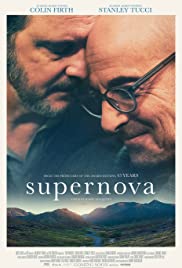
SUPERNOVA
UK, 2020, 95 minutes, Colour.
Colin Firth, Stanley Tucci, Hayward, Peter Mac Queen.
Directed by Harry Mac Queen.
The supernova can serve as a bright metaphor for human life. As we see in the opening credits, gazing at the stars in the sky, gradually multiplying and multiplying, bright stars, and a supernova at the centre, flaring vividly, then disappearing, dying.
So the image is used for one of the two central characters of this two-handed drama, the story of the final times of a long-term relationship between the men, Sam and Tusker. Each of them has, in his own way, publicly, Tusker as a published novelist, Sam as a concert pianist, have had their moments of brightness. Now, Tusker is terminally ill.
Basically, the framework of the narrative is a road trip. And an opportunity to visit the range of vistas in the English countryside, the roads, the fields, the mountains, and visits to country homes. Tusker has organised the itinerary. Sam does the practical work, packing, driving, shopping. And the immediate destination is the family home of Sam’s sister, a stopover on the road trip.
Sam is played by Colin Firth, always a strong and reliable screen presence. Tall and strong, he seems to tower over his co-star, Stanley Tucci, who plays Tusker. And the point of the road trip is that Tusker has been diagnosed with the onset of dementia, gradually taking him over, difficulties in memory, confusion in physical coordination, unable physically to write or do up shirt buttons. And, he can be cantankerous, even with Sam, despite their decades of being together.
One of the main issues is the depiction of the onset of dementia, the gradual physical manifestations, the psychological manifestations, difficulties in communication, and depression consequences, even to the consideration of suicide, not wanting to be the object of pity when all consciousness memories of the past have gone. The screenplay does raise the issues of palliative care, possibilities of life for the person experiencing dementia. The screenplay raises the issue of personal decisions, the reasons for taking one’s own life.
And, the other issue is the role and responsibilities of the carer, and a lifetime of love which motivates the caring, prepared to look after the partner whatever the gradual and long-term deterioration.
Which means that there are some moving and challenging conversations throughout the film between the two men. When they stop at Sam’s sister’s house, there are further discussions, especially during a surprise party, longtime relatives and friends being supportive and caring.
There is also a musical motif throughout the film, excerpts from quite a number of songs, but the playing of a piano piece by Edward Elgar, culminating in the public performance by Sam in a concert.
Films like Supernova raise for the audience, the realities of the onset of dementia, the consequences for the person concerned, for relatives and friends, and for the moral choices to be made.
A helpful reference on dementia is the film, released at the same time, The Father, with a powerful performance by Anthony Hopkins bewildered by his experience of dementia.
1. The title? A supernova flaming, then dying? The visuals for the opening credits, the sky, the stars, the supernova, bright, disappearing? The final images of the sky, Sam lying, looking at the sky?
2. The title as a symbol for Tusker and his life?
3. The English settings, the roads, the countryside, fields, mountains, country homes? Interiors? The musical score? The Elgar theme?
4. Sam and Tusker, late 50s, their long relationship? Tusker and his novels? Sam, the piano? Their characters, interactions, Tusker planning the trip, Sam agreeing? The plan, Sam’s concert, the bonding between them?
5. Tusker’s illness, prognosis, gradual dementia? Loss of memory? Physical and abilities, to write, do up buttons…? Tusker and his acceptance? The revelation that he had bought pills to commit suicide? His not wanting any advice on further medication? His love for Sam, erratic moods, walking from the supermarket with the dog? The challenge of writing a novel, his not being able to write, literally?
6. Sam, personality, love for Tusker, prepared to care for him? Driving the van, packing everything? His reaction to Tusker during the trip, his comments, not talking, falling asleep? The set up in the van, comforts, travel? Sam worried when Tusker walked off with the dog?
7. The destination, Sam and his sister, the family, the welcome, the surprise party and all the guests, the conversations, each having the need to go outside? Sam and the discussions with Tim, Tim’s revelation about Tusker’s inability to write?
8. The family, the welcome, the dinner conversation, the warmth of the relationships? The farewell to Tusker?
9. On the road again, the issue of the country house, to go home again or not, Tusker wanting the country house? Their settling in?
10. The conversations between the two, Sam and his discovery of the truth, Tusker’s scribble in his book, the pills, confronting Tusker? Tusker and his explanations, not wanting to be the object of pity, for Sam having to care for him?
11. Sam, playing the piano, the Elgar, Tusker liking it? Sam and his resignation? Tusker and his resignation? Sam lying and looking at the sky?
12. The concert, the Elgar, in memory of Tusker?
13. The issues of relationships, the gay relationship for many decades, the quality of a loving relationship?
14. Issues of illness, dementia, medication, palliative care, suicide?